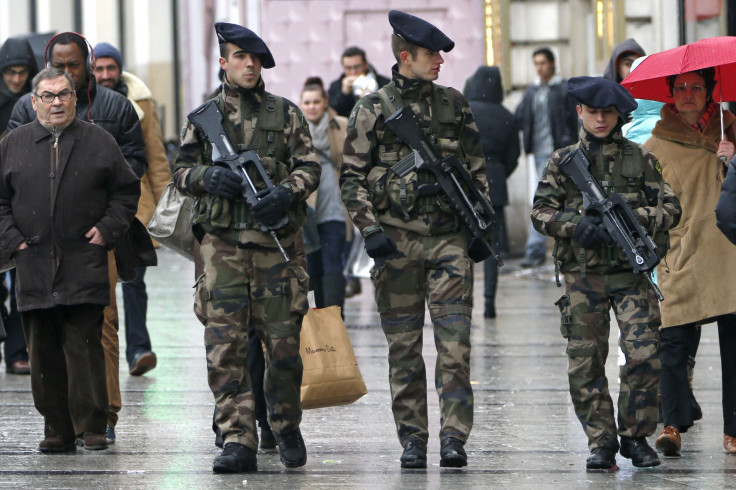Terrorist Threat On French Soil Rises After Mali Intervention

As French troops engage in combat operations across the semi-arid lands of northern and central Mali, there are growing concerns about the security of French civilians at home.
The military intervention aims to protect global -- and French -- security in the long term, by targeting jihadists who were building a haven in the hinterland of West Africa. But in the short term, the conflict is only generating more animosity from Islamist militants.
Already, several insurgency leaders and spokesmen have called for a strong response to French intervention, encouraging a global jihad that would extend beyond Africa. Paris, keen to prevent the sort of “lone wolf” operatives who have threatened French society for decades, raised the terror security threat level and increased domestic security operations.
The situation is tense as clashes in Mali continue to unfold, with no easy end in sight.
Swooping In
France swept into Mali on Jan. 11, after Islamist groups -- which had occupied the northern areas of the country for a year -- began pushing further south, overtaking central towns and threatening the capital city of Bamako. First came airstrikes; then came ground combat. Both continue.
Thousands of Malian soldiers, as well as a steadily growing force of African troops from nearby countries, compose part of the counterinsurgency efforts. Also involved are Western powers like the United States and the United Kingdom, which are providing surveillance and logistical support but no combat troops.
Some observers have found it strange that France -- led by the Socialist administration of new President Francois Hollande, whom many consider to be a rather dovish leader -- would be the one to lead the charge in Mali.
But the decision didn’t come entirely out of the blue. The Bamako administration asked for an intervention, and Paris has traditionally played a role as a strong partner to its former African colonies. Furthermore, France has maintained military capabilities and defense spending to an extent unmatched by other European powers, despite the debt crisis on the continent.
Most importantly, France saw an immediate need to clamp down on the insurgency -- which has links to al-Qaeda -- in order to prevent Islamist militants from establishing a base relatively close to Europe.
“The decision by Hollande to launch this intervention came as some surprise because he was, as a principle, very opposed to French involvement in France’s former colonies,” says Stephanie Pezard, a Washington-based political scientist and security specialist with the RAND Corporation.
“But I think he had to make an exception when the Islamist groups in northern Mali began to make their way south toward Bamako, which would have been devastating in terms of the number of French people there and the potential consequences for the Malian state. The urgency of the situation overtook the principle of noninterference.”
Staying Safe
As the jihadists in Mali call for retaliation, France has heightened security measures at home. But despite the increased level of threat, the French citizenry remains supportive of the intervention. According to a Jan. 15 poll, 75 percent of the population stood behind Hollande’s decision.
France is no stranger to terrorist threats. In October of last year, police arrested 12 people in connection with an alleged bomb plot, which authorities said would have been the worst act of violence the country has seen in years. In March, a 23-year-old Islamist of Algerian background killed seven people, including Jewish schoolchildren, in a shooting spree in the southern city of Toulouse.
But the worst era of terrorist violence in France was during the mid-1990s, during the bloody Algerian civil war that pitted Islamists against the military regime there. A series of bombings in Paris -- a spillover from the conflict in North Africa -- wounded scores of civilians and killed at least eight.
Considering its long history of responding to incidents like this, says Pezard, France’s recent decision to ramp up security is nothing new.
“The threat level has been elevated, but this has also been done in the past -- since the bombings of the 1990s,” she said. “There’s a very well-developed system of early alerts, increasing patrols, patrolling stations and airports and so on. All of these controls have now been reinforced because of the new threats. I don’t think there has been any radical change in this regard.”
Branching Out
The threat of retaliatory attacks following the French intervention has already materialized in Algeria, where a group of militants seized a gas complex in the eastern part of the country last week and took hundreds of hostages. A siege by Algerian troops has ended the crisis, but at least 69 people -- many of them foreigners -- have lost their lives.
Mokhtar Belmokhtar, the apparent leader of the group that seized the plant, has been on the radar of French authorities for years. He claimed that the Algerian operation was a victory for al-Qaeda in the Islamic Maghreb, or AQIM, a group he has been affiliated with in the past.
"We in al-Qaeda announce this blessed operation," said Belmokhtar, according to a Mauritanian website called Sahara Media. "We are ready to negotiate with the West and the Algerian government provided they stop their bombing of Mali's Muslims.”
For French citizens, such claims are cause for some alarm -- especially since Belmokhtar has encouraged Islamists already on French soil to perpetrate attacks there.
But defense officials are banking on the idea that clamping down on Malian insurgents now is the only way to protect their own citizens going forward.
“People often ask how long this will last,” said Hollande on Saturday, according to Reuters. “I reply, the time it takes. The time it takes to vanquish terrorism in this area.”
© Copyright IBTimes 2025. All rights reserved.






















